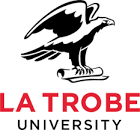Designed to help you build our digital future, La Trobe's Bachelor of Information Technology equips you with skills across programming, networking, databases, systems analysis and design, and project management.

Designed to help you build our digital future, La Trobe's Bachelor of Information Technology equips you with skills across programming, networking, databases, systems analysis and design, and project management.
Along with building a strong set of core IT skills you can choose to major in one of several areas aligned to future industry growth including artificial intelligence, cloud analytics, cybersecurity, network engineering or information systems.
Broaden your knowledge and capabilities further through a wide range of electives. Combine your core IT skills with business, social sciences, humanities, web engineering, computer technology, security and information systems analysis subjects.
Plus you could develop a software program of your own, which you could present at the annual Engineering and IT Showcase to potential employers.
With industry-based projects and CISCO certification embedded in the course, you'll receive professional mentoring opportunities as you build career ready skills.
You'll also gain access to our expert research centres, including the Centre for Technology Infusion and our state-of-the-art Technology Innovation Lab for the Internet of Things – developed in collaboration with Microsoft and CISCO.
Bachelor of Information Technology intended learning outcomes
Apply information technology knowledge and skills, and critical thinking to find practical and innovative solutions for industry problem
Evaluate the suitability of information technology to develop and implement appropriate solutions
Work effectively both autonomously and in collaboration with others to complete information technology projects to professional standards
Apply awareness of the ethical and cultural values to shape the complex professional work of information technology professional
Apply well-developed skills in information technology to find sustainable solutions across diverse business environments
Engage diverse audiences to explain and present ideas and build influential relationships.
Apply standards, methods, tools and applications relevant to a specialist information technology area to make appropriate decisions.
Bachelor of Information Technology career opportunities
After you graduate, you could work across almost any sector – including technology, communications, education, finance, government, healthcare and energy.
Possible roles include:
Network administrator
Develop, install and provide maintenance support across network and computer systems including local area networks (LANs), wide area networks (WANs), network segments, intranets and other data communication systems.
Web developer
Design, build and maintain websites using both creative and technical skills to continuously improve safety, performance, usability and capacity.
Network architect
Plan and build data communication networks to provide both local and global connections. Analyse and implement new technologies and provide solutions to maintain and improve technical infrastructure.
Software developer or programmer
Design, test and develop software to meet user needs. Write code for programs and applications that adapt and respond to changing business requirements.
Machine learning engineer
Use data science to design and develop machine learning systems that perform statistical analysis and help to drive innovation in artificial intelligence.
Systems analyst
Analyse software, hardware and information systems to ensure they're appropriate for the business or client and help to develop and improve these systems and workflows.
Professional recognition
The Bachelor of Information Technology is accredited by the Australian Computer Society (ACS). Graduates of the Bachelor of Information Technology may apply for membership with the ACS.
Membership may be subject to additional or ongoing requirements beyond completion of the degree. Please contact the relevant professional body for details.
We've designed our courses with real-world career outcomes in mind, so you can turn your passion into an in-demand career once you graduate.
We also have a huge range of customisable degrees to choose from, with majors, minors and electives from more than 50 interest areas and the career tools you need to find the course that's right for you.
With a proud history built on a mission to advance knowledge and learning to shape the future of our world, we are the most successful Australian university at combining accessibility and excellence. Our passionate teachers deliver globally recognised learning to our diverse student body.
Our key values include inclusiveness, diversity, equity and social justice. Access to higher education is a vital consideration in our learning and teaching approach. We develop research and policies to improve the access and achievement of under-represented students.
© 2025 coursetakers.com All Rights Reserved. Terms and Conditions of use | Privacy Policy